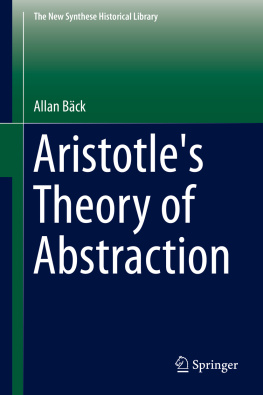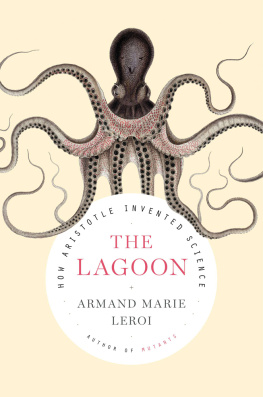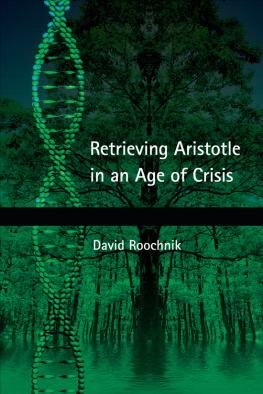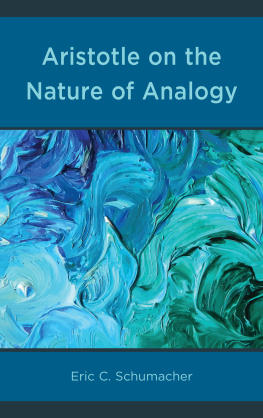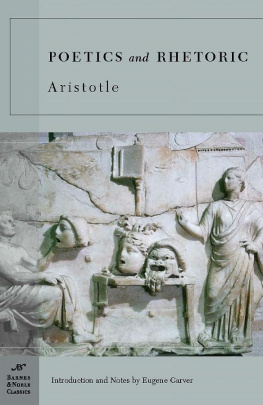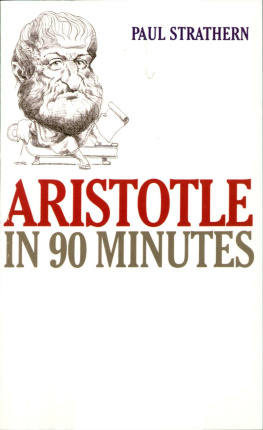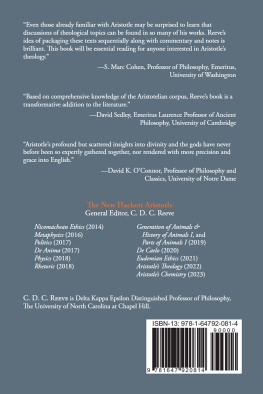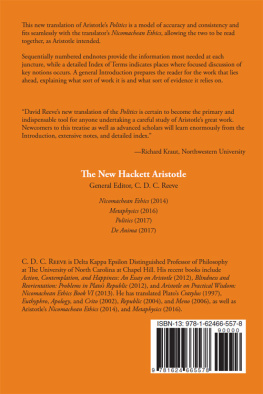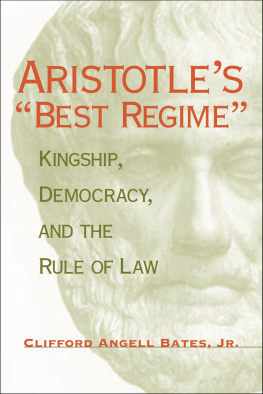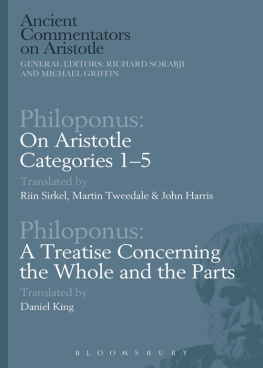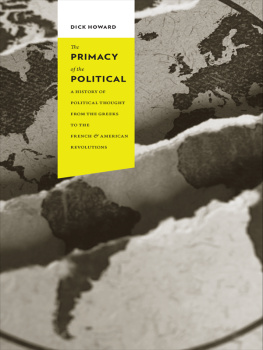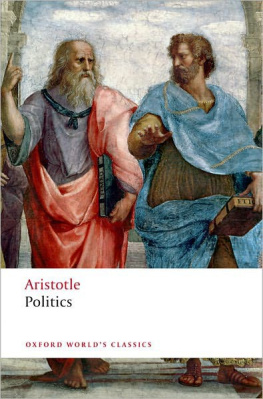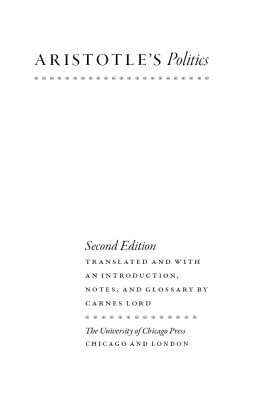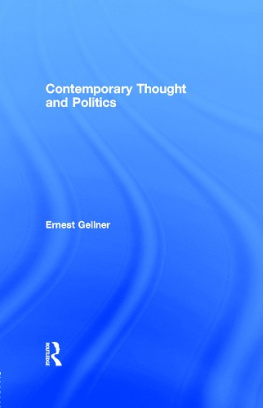OXFORD WORLDS CLASSICS
POLITICS
ARISTOTLE (384322 BC), with Plato one of the two greatest philosophers of antiquity, and in the view of many the greatest philosopher of all time, lived and taught in Athens for most of his career. He began as a student in Platos Academy and may for some time have acted as tutor to Alexander the Great. He left writings on a prodigious variety of subjects, covering the whole field of knowledge from biology and astronomy to rhetoric and literary criticism, from political theory to the most abstract reaches of philosophy. The Politics was probably written towards the end of his career when he was head of the Lyceum and draws on Aristotles own extensive research into the constitutional affairs of the Greek cities. It is possibly the most influential book on political theory ever to be written.
Sir ERNEST BARKER (18741960) held fellowships at several Oxford colleges before becoming Principal of Kings College London in 1920 and Professor of Political Science at Cambridge in 1928. He retired in 1939. He was one of the most distinguished scholars of his day and had a lifelong love for Aristotles Politics. His many publications included The Political Thought of Plato and Aristotle (London, 1906). His translation of the Politics was first published in 1946.
R. F. STALLEY studied Classics and Philosophy at Oxford and spent a year at Harvard as Frank Knox Memorial Fellow. He subsequently taught philosophy at the University of Glasgow. His main interest has been in the political philosophy of Plato and Aristotle. His publications in this field include An Introduction to Platos Lam (Oxford, 1983).
OXFORD WORLDS CLASSICS
For over 100 years Oxford Worlds Classics have brought readers closer to the worlds great literature. Now with over 700 titlesfrom the 4,000-year-old myths of Mesopotamia to the twentieth centurys greatest novelsthe series makes available lesser-known as well as celebrated writing.
The pocket-sized hardbacks of the early years contained introductions by Virginia Woolf, T. S. Eliot, Graham Greene, and other literary figures which enriched the experience of reading. Today the series is recognized for its fine scholarship and reliability in texts that span world literature, drama and poetry, religion, philosophy, and politics. Each edition includes perceptive commentary and essential background information to meet the changing needs of readers.
Refer to the to navigate through the material in this Oxford Worlds Classics ebook. Use the asterisks (*) throughout the text to access the hyperlinked Explanatory Notes.
OXFORD WORLDS CLASSICS

ARISTOTLE
Politics

Translated by
ERNEST BARKER
Revised with an Introduction and Notes by
R. F. STALLEY


Great Clarendon Street, Oxford OX2 6DP
Oxford University Press is a department of the University of Oxford.
It furthers the Universitys objective of excellence in research, scholarship,
and education by publishing worldwide in
Oxford New York
Athens Auckland Bangkok Bogot Buenos Aires Calcutta
Cape Town Chennai Dar es Salaam Delhi Florence Hong Kong Istanbul
Karachi Kuala Lumpur Madrid Melbourne Mexico City Mumbai
Nairobi Paris So Paulo Singapore Taipei Tokyo Toronto Warsaw
with associated companies in Berlin Ibadan
Oxford is a registered trade mark of Oxford University Press
in the UK and in certain other countries
Published in the United States
by Oxford University Press Inc., New York
Oxford University Press 1995
The moral rights of the author have been asserted
Database right Oxford University Press (maker)
First published as a Worlds Classics paperback 1995
Reissued as an Oxford Worlds Classics paperback 1998
All rights reserved. No part of this publication may be reproduced, stored in a retrieval system, or transmitted, in any form or by any means, without the prior permission in writing of Oxford University Press, or as expressly permitted by law, or under terms agreed with the appropriate reprographics rights organizations. Enquiries concerning reproduction outside the scope of the above should be sent to the Rights Department, Oxford University Press, at the address above
You must not circulate this book in any other binding or cover
and you must impose this same condition on any acquirer
British Library Cataloguing in Publication Data
Data available
Library of Congress Cataloging in Publication Data
Data available
ISBN 0192833936
5 7 9 10 8 6
Printed in Great Britain by
Cox & Wyman Ltd.
Reading, Berkshire
CONTENTS
INTRODUCTION
ARISTOTLES Politics raises more clearly than any other text some of the most fundamental issues which confront anyone who attempts to think seriously about the ways in which human societies are organized and governed. These issues are as pressing now as they were in the fourth century BC when the Politics was first written. But although the Politics can still speak to us with a powerful voice there are a number of ways in which it is unlike any modern text and in which it can appear puzzling to the modern reader. First, it is not the work of a narrow specialist but is part of what is probably the most comprehensive system of thought ever devised. We need therefore to relate the Politics to the general principles and methods of Aristotles philosophy. Secondly, the world in which Aristotle lived was very different from our own. So, although the fundamental issues may be the same as those which concern us, the context in which Aristotle raises them may seem very unfamiliar. We have therefore to study the Politics against the background of the Greek world as it was in the fourth century BCa world in which the basic unit of political organization was not the nation state but the small independent city-state or polis. Thirdly, there are, as one might expect, difficulties in the style, organization, and vocabulary of Aristotles writing which have to be addressed if we are to read it with any understanding.
Aristotle on the Nature of Society
Aristotle was not only a great philosopher but also what we would now call a scientist. In particular he wrote extensively on biological topics and his study of biology clearly exercised a powerful influence on his thought in other areas. It makes sense therefore to begin a study of the Politics by thinking about Aristotles conception of nature (phusis) in its bearing on political matters.
During the fifth century the Greeks had evidently become particularly conscious that laws and customs varied from people to people and from place to place. According to a story told by Herodotus (III. 8), the Greeks were shocked to hear that some Indian peoples ate their dead. The Indians were equally shocked to hear that the Greeks burned theirs. Thus what seemed right to one people seemed wrong to another. To understand such phenomena many Greek thinkers used the two contrasting terms phusis or nature and nomos
Next page

